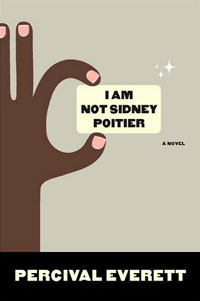Hahaha, “Ask a Mid-List Author,” good one J. Robert Lennon. AND the new Graywolf site is nice.
I Am Not Sidney Poitier
 I Am Not Sidney Poitier
I Am Not Sidney Poitier
by Percival Everett
Graywolf Press, 2009
270 pages / $16.00 Buy from Graywolf Press
Rating: 8.4
Adjectives frequently used to describe Percival Everett include “intelligent” and “hilarious,” and are also apt descriptors for his seventeenth (!) novel, I Am Not Sidney Poitier. It is difficult to imagine a funnier book dealing with issues of race and identity, or a more sophisticated comic romp. The humor (and confusion) begins with the title, which refers to the novel’s main character, literally named Not Sidney Poitier. The “ill-starred fruit of a hysterical pregnancy” that lasts two years, Not Sidney is an orphan raised by Ted Turner who comes to resemble the actor Sidney Poitier. The unexpected death of Not Sidney’s mother leaves him with incredible wealth in the form of shares in the Turner Broadcasting Corp.
August 4th, 2011 / 12:04 pm
The Art of Recklessness
 I’m reading Dean Young’s new nonfiction book, The Art of Recklessness, part of The Art Of Series from Graywolf Press. Only 30 pages in, and I feel like I’ve swan dived into the swirling, dangerous waters of Young’s unbelievably complex collector’s brain. I love it. Here’s a review.
I’m reading Dean Young’s new nonfiction book, The Art of Recklessness, part of The Art Of Series from Graywolf Press. Only 30 pages in, and I feel like I’ve swan dived into the swirling, dangerous waters of Young’s unbelievably complex collector’s brain. I love it. Here’s a review.
On page 12, Young quotes Wallace Stevens:
It is necessary to any originality to have the courage to be an amateur.
This is the exact idea I want to relay to my students when school starts next week. Not being shackled to rules, allowing poems to fall out of you un-self-consciously, is what makes great art. Learning craft so that you don’t have to think about it should probably happen simultaneously, but without imagination, recklessness, fire you’re fucked.
This is a different kind of book, one that might be the most important kind. I’ll follow up when I’ve actually finished reading it.
August 12th, 2010 / 8:26 am
Benjamin Percy is a Writer I’d Like to Fuck

Bejamin Percy is Fucking Hot
Benjamin Percy begs the question, do I have to like a writer’s writing to want to fuck him? Alas, I think the answer would be yes, but I would make an exception for Percy if I were to not like his writing. He’s that hot. Now, as it is, I really REALLY like his writing! So, the question is really moot. But, my point is, how smoking HOT is he? (I’ll get to his fiction in a minute). Here’s a bit from an interview in Bookslut that exemplifies one of the reasons I’d like to fuck him:
Some writers go for walks when they’re trying to work something out in their head. I go to the gym. Sometimes you need to get away from the keyboard and feel the blood flowing through your stiff limbs before the next idea comes hurtling toward you. So I pick up large pieces of metal and put them back down again.
The man has PIPES! As does his prose. Percy is an unabashedly masculine writer. A rich manliness oozes from not only his subject matter- war, guns, all sorts of men stuff–but also his prose style. I wouldn’t call him a “plain” writer; indeed, he can be very stylized, with an acute attention to the music of language. But his fiction feels honest and hard, like a dick in my hand should feel.
The Art of…

I guess I could preface this recommendation with a short essay on whether or not a person can learn to be a writer. I guess I could.
I won’t, though. Not now. Not in the mood.
I don’t, though, have a lot of interest in books on how to write. Not usually. Not many. Gardner’s book, sure. Some of Kundera’s essays. Some of Nabokov’s lectures. Borges’. Barthelme’s. Calvino’s.
And one more: Charles Baxter. Both Burning Down the House and The Art of Subtext have been invaluable to me. Not in that his books offer blueprints, or prescriptive advice. Baxter just thinks about his writing, and the writing of others, in really interesting ways. And reading an essay that he has written about one aspect of, say, Chekhov’s writing, invariably does the triple duty of not simply making you see an element in Chekhov’s writing in a new way, or getting you to find similar tactics in the writing of others, but his work rearranges the way you read, rearranges your brain, and you start finding new and interesting things that have nothing to do with Baxter’s essays whenever you read.
That’s what I’ve noticed, anyway.
He’s editing a series called The Art of…for Graywolf Press. His book is pretty damn good.
